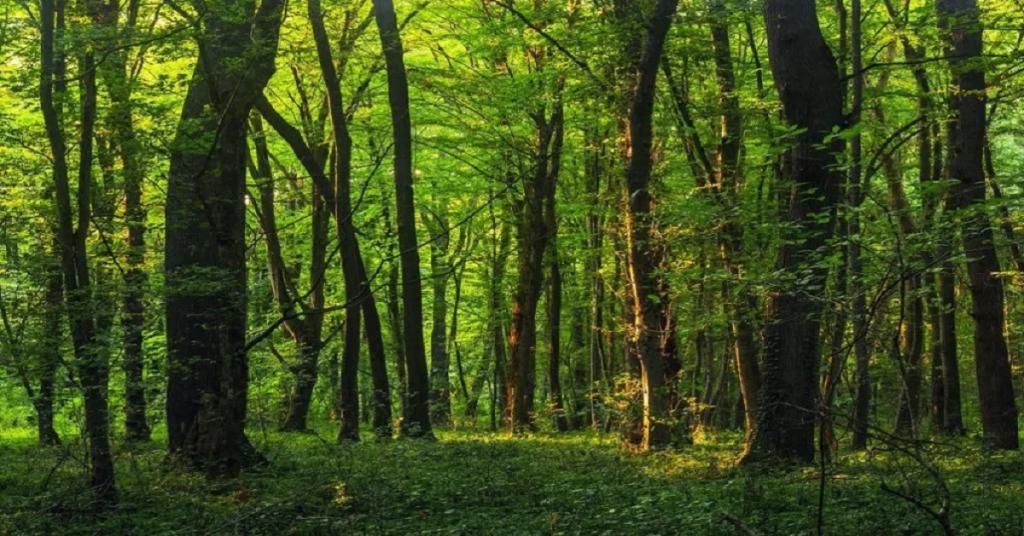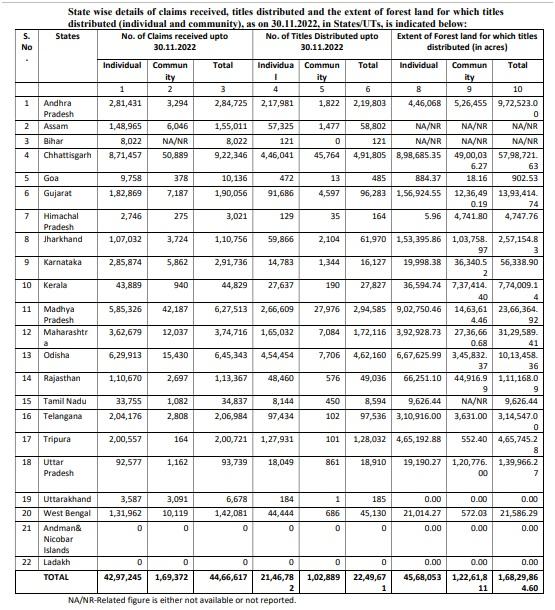
Asked about FRA implementation in states, MoTA dodges accountability Data on claims settled and titles distributed state-by-state until November 30, 2022 provided by the government
06, Feb 2023 | CJP Team
During the ongoing special Budget Session of the Parliament, on February 6, 2023, Lok Sabha member Shri Syed Imtiaz Jaleel (AIMIM) inquired with the government regarding the traditional forest dwellers present in the country. Shri BishweswarTudu, Minister of the Tribal Affairs, then provided the number of district-wise villages/habitations in each State who have claimed Community Forest Resource Rights under Section 3(1) (i) of FRA along with the number of claims that have been approved by the Gram Sabha. The data, as on November 30, 2022, is as follows:

The total number of claims that were received by the state governments, up to November 30, 2022, were 44,66,617, out of which 42,97,245 were claims of the individuals and 1,69,372 were claims for community rights.
Among its four pillars of action, the land and livelihood rights of Adivasis and traditional forest dwellers, is one. CJP, with its expertise in navigating cases of human rights violations in the courts and beyond has been active on the issue; partnering with the All India Union of Forest Working Peoples (AIUFWP) since 2017 to battle any setback to these rights in the courts. This includes legally fighting back against malicious prosecution of leaders of the community and defending the Forest Rights Act, 2006 in the Supreme Court. We stand with the millions of Forest Dwellers and Adivasis whose lives and livelihoods are threatened. Please support our efforts by donating here.
With regard to the number of titles distributed up to November 30, 2022, the government informed that a total of 22,49,671 titles have been distributed, out of which 21,46,782 were individual titles and 1,02,889 were community titles. Additionally, the government also provided the details regarding the extent of forest land for which titles have been distributed, which came to a total 1,68,29,864.60 acres. Out of these 1,68,29,864.60acres, the titles distributed over individual claims were for 45,68,053 acres while the community titles were for 1,22,61,811 acres; which means more than 80% of total land for which titles have been distributed, has been given to community claimants.
Chhattisgarh was the state with the highest number of claims received until November 30,2022 with 9,22,346 claims and it also topped in the number of titles distributed with 4,91,805 titles; out of these 4,46,041 titles were given to individuals. Second in line is Odisha with 6,45,343 claims and 4,62,160 titles disbursed.
On the other hand, the lowest claims were received by Himachal Pradesh, with 3,021 claims and Bihar awarded the lowest number of titles which was 121. It is pertinent to note here that data of only 22 States and UTs has been provided by the Ministry. In all India consists of 28 states and 8 union territories.
It is further crucial to note that a crucial inquiry regarding the number of potential villages/habitations, district-wise, in each State where the Scheduled Tribes and Other Traditional Forest Dwellers (Recognition of Forest Rights) Act 2006 (FRA) being implemented was also raised in the Lok Sabha. In response to this question, Shri BishweswarTudu informed that it is the states that are responsible for implanting FRA. No data was provided on the same by the government.
The complete answer can be read here:
Whose rights does the FRA recognise?
The FRA 2006 enables traditional forest dwelling communities to apply for claims to land and forest produce upon which they have been dependent for their livelihood for generations. The Act recognises the rights of two types of forest dwellers –Adivasi or indigenous tribal communities, many of which as included in the list of Scheduled Tribes (ST), and Other Traditional Forest Dwellers (OTFD).
Earlier this month, in February, hundreds of tribal people assembled and carried out a rally at dense forest areas of Dhekwah village in Rajapur gram panchayat of Marihan tehsil under Mirzapur district on Monday, demanding implementation of the Forest Rights Act (FRA) and the withdraw all cases registered against them. The protesters, who marched to the ‘stone rocks’ on the banks of Jharinagari Nala, also sought 200 days minimum work for labourers in a year on Mahatma Gandhi National Rural Employment Guarantee Act (MGNREGA) job card and Rs 600 wage/day.
In January, the NCST, through its Chairman Harsh Chouhan, hadcemented its stand against the Forest (Conservation) Rules, 2022 reiterating that the rules are violative of the Forest Rights Act, 2006. The Ministry of Environment, Forest and Climate Change insists that these concerns are not legally tenable. While speaking to The Hindu, Chouhan had said that “The commission’s stand will be the same. It is the commission’s duty to intervene and recommend corrective measures whenever any rules run the risk of violating rights of tribespeople. This we will continue to do.”
In September 2022, the NCST Chairman had written to the Environment Ministry asking it to put the rules on hold for the rules have taken away rights of Scheduled Tribes to consent to any diversion project in forest areas.
CJP battle to ensure justice for the forest dwellers
Forest Dwellers in other states have been a part of this struggle for staking their claims over forest rights for years. Sabrang India’s sister organization, Citizens for Justice and Peace (CJP) along with its partner organization All India Union of Forest Working People (AIUFWP) have been helping Adivasis file these community land claims in different states such as Uttar Pradesh, Uttarakhand and Madhya Pradesh among others.
In November 2021, forest dwelling communities belonging to the Tharu Adivasi community residing in 20 villages of the Dudhwa region of Lakhimpur Kheri, Uttar Pradesh, filed their Objections to denial of community land claims with the district administration. These claims had been filed way back in 2013.
In August, 2022 it was reported that, as many as 16,000 claims were rejected in just two regions of Karnataka – Sagar and Shivamogga. Out of the total 16,424 applications filed in Sagar, only 505 were approved and 4,993 were rejected, leaving 10,926 applications pending. Similarly, out of the 19,191 applications filed in Shivamogga, 11,982 were rejected and only 236 approved, leaving 6,973 pending.
Related:
UP: Tribals Protest In Mirzapur, Demand Implementation Of Forest Rights Act, Allege Harassment
GuttiKoyas (Maru) Adivasis from Chhattisgarh face eviction in Telangana
Are over 1,10,000 Adivasis & Forest Dwellers at risk of eviction and loss of livelihood?
Chhattisgarh: A minor dead in missile strike on Koya Adivasis










